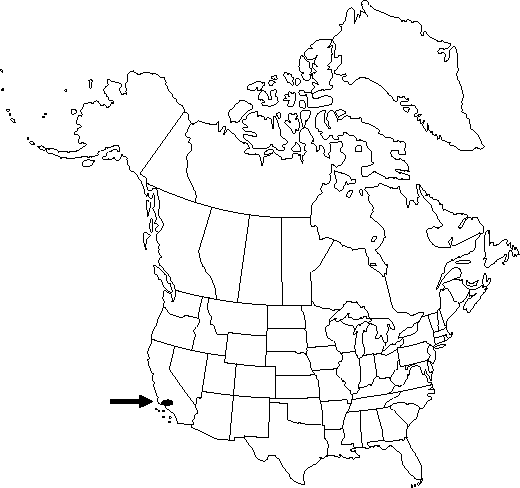familyRanunculaceae
genusDelphinium
subsectionDelphinium subsect. Subscaposa
speciesDelphinium parryi
subspeciesDelphinium parryi subsp. purpureum
Difference between revisions of "Delphinium parryi subsp. purpureum"
Phytologia 68: 2. 1990.
Common names: Mount Pinos larkspur
Conservation concernEndemic
Basionym: Delphinium parishii subsp. purpureum H. F. Lewis & Epling Brittonia 8: 15. 1954
Treatment appears in FNA Volume 3.
FNA>Volume Importer |
imported>Volume Importer |
||
| (7 intermediate revisions by 2 users not shown) | |||
| Line 15: | Line 15: | ||
|label=Endemic | |label=Endemic | ||
}} | }} | ||
| − | |basionyms={{Treatment/ID/ | + | |basionyms={{Treatment/ID/Basionym |
|name=Delphinium parishii subsp. purpureum | |name=Delphinium parishii subsp. purpureum | ||
|authority=H. F. Lewis & Epling | |authority=H. F. Lewis & Epling | ||
| + | |rank=subspecies | ||
| + | |publication_title=Brittonia | ||
| + | |publication_place=8: 15. 1954 | ||
}} | }} | ||
|synonyms= | |synonyms= | ||
| Line 27: | Line 30: | ||
}}<!-- | }}<!-- | ||
| − | --><span class="statement" id="st- | + | --><span class="statement" id="st-undefined" data-properties=""><b>Roots </b>usually more than 10 cm. <b>Stems</b> 30-90 cm. <b>Leaves</b> mostly on proximal 1/3 of stem; basal leaves usually present at anthesis; blade with ultimate lobes 3-20, width less than 4 mm. <b>Inflorescences</b>: bracteoles 3-6 mm. <b>Flowers</b>: sepals usually reflexed, lateral sepals 7-11 mm, spurs 10-13 mm; lower petal blades 3-5 mm. <b>2n</b> = 16.</span><!-- |
-->{{Treatment/Body | -->{{Treatment/Body | ||
| Line 35: | Line 38: | ||
|distribution=Calif. | |distribution=Calif. | ||
|discussion=<p>Of conservation concern.</p><!-- | |discussion=<p>Of conservation concern.</p><!-- | ||
| − | --><p>Delphinium parryi subsp. purpureum may be imperiled by human encroachment.</p><!-- | + | --><p><i>Delphinium parryi </i>subsp.<i> purpureum</i> may be imperiled by human encroachment.</p><!-- |
| − | --><p>This taxon may be confused with Delphinium parishii, but its abundant arched hairs and lack of wider-lobed basal leaves will distinguish D. parryi subsp. purpureum. It hybridizes with D. parishii subsp. pallidum.</p> | + | --><p>This taxon may be confused with <i>Delphinium parishii</i>, but its abundant arched hairs and lack of wider-lobed basal leaves will distinguish <i>D. parryi </i>subsp.<i> purpureum</i>. It hybridizes with <i>D. parishii </i>subsp.<i> pallidum</i>.</p> |
|tables= | |tables= | ||
|references= | |references= | ||
| Line 45: | Line 48: | ||
-->{{#Taxon: | -->{{#Taxon: | ||
name=Delphinium parryi subsp. purpureum | name=Delphinium parryi subsp. purpureum | ||
| − | |||
|authority=(H. F. Lewis & Epling) M. J. Warnock | |authority=(H. F. Lewis & Epling) M. J. Warnock | ||
|rank=subspecies | |rank=subspecies | ||
| Line 60: | Line 62: | ||
|publication year=1990 | |publication year=1990 | ||
|special status=Conservation concern;Endemic | |special status=Conservation concern;Endemic | ||
| − | |source xml=https:// | + | |source xml=https://bitbucket.org/aafc-mbb/fna-data-curation/src/2e0870ddd59836b60bcf96646a41e87ea5a5943a/coarse_grained_fna_xml/V3/V3_42.xml |
|genus=Delphinium | |genus=Delphinium | ||
|section=Delphinium sect. Diedropetala | |section=Delphinium sect. Diedropetala | ||
| Line 66: | Line 68: | ||
|species=Delphinium parryi | |species=Delphinium parryi | ||
|subspecies=Delphinium parryi subsp. purpureum | |subspecies=Delphinium parryi subsp. purpureum | ||
| − | |||
| − | |||
| − | |||
| − | |||
| − | |||
| − | |||
| − | |||
| − | |||
| − | |||
| − | |||
}}<!-- | }}<!-- | ||
-->[[Category:Treatment]][[Category:Delphinium parryi]] | -->[[Category:Treatment]][[Category:Delphinium parryi]] | ||
Latest revision as of 21:48, 5 November 2020
Roots usually more than 10 cm. Stems 30-90 cm. Leaves mostly on proximal 1/3 of stem; basal leaves usually present at anthesis; blade with ultimate lobes 3-20, width less than 4 mm. Inflorescences: bracteoles 3-6 mm. Flowers: sepals usually reflexed, lateral sepals 7-11 mm, spurs 10-13 mm; lower petal blades 3-5 mm. 2n = 16.
Phenology: Flowering late spring–early summer.
Habitat: Dry chaparral, sage scrub and lower montane woods
Elevation: 1000-1600(-2400) m
Discussion
Of conservation concern.
Delphinium parryi subsp. purpureum may be imperiled by human encroachment.
This taxon may be confused with Delphinium parishii, but its abundant arched hairs and lack of wider-lobed basal leaves will distinguish D. parryi subsp. purpureum. It hybridizes with D. parishii subsp. pallidum.
Selected References
None.
Lower Taxa
None.
